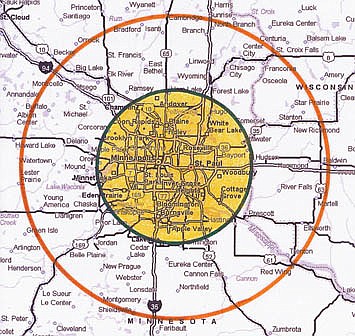June 8, 2006 at 6:55 a.m.
Early talks looking into organizing private commuter bus route along Hwy. 8
Two transportation consultants met at the Center City Municipal Building with representatives from Taylors Falls, Shafer, Center City and Lindstrom, and John Moosey, county administrator.
Lisa Raduenz and Robert Kortum, of LJR Inc. talked about a Hwy. 55 transit route serving Buffalo to Minneapolis commuters and asked the public officials to get involved in developing a similar system through the Hwy. 8 corridor.
“We wanted to meet with you and get a sense of what model of service is needed here,” they told the informal group.
Raduenz said as a transportation planner she is “frustrated” because the Minnesota Department of Transportation controls most of the seed money and operational funding for transit programs, but the commuting population residing outside the main metro counties is being “ignored.”
Raduenz said transit services like Chisago county’s Heartland Express -- ones that transport by appointment-- do get subsidy funding and this is appropriate because these kinds of services meet a particular need. Raduenz and Kortum said they do not look to undermine the importance of transit systems like Heartland Express but they believe there’s untapped ridership for the commuter line they envision.
The goal of calling the meeting is to get government entities along the Hwy. 8 corridor to cooperate on developing a service with a private bus company. Local officials’ help is needed for identifying pickup and drop off locations, to identify metro destinations that would be most desired and help determine times for the routes. The idea of using survey that could be distributed by cities on the highway route was discussed.
Brenda Palmquist, Chisago Lakes Area Chamber of Commerce Director, said the chamber could play a role in helping create this type of service, possibly coordinating pickup and drop locations with local businesses.
The consultants left a copy of the Buffalo Transit Bus Survey with those attending the meeting. This survey was key as an initial step in getting the Great Rivers Transit Company’s Hwy. 55 service running, offering schedules that best address needs. The survey had been sent out with Buffalo’s city utility billing.
Raduenz and Kortum offered to work with private transit providers in the future on a route, but there was no commitment made at this first info session.
Lindstrom City Administrator John Olinger observed any system should also offer alternatives to a.m. and p.m. specific routes and times. He thought a “package” of service could be created to address those times when emergency transportation may be needed by a rider or to add collector services, etc.
Kortum informed the group that Buffalo approached its commuter transit program by first establishing a City Transit Board that oversaw the development of the system there and was responsible for generating public discussion and review.
The city councils’ next step would likely be to put the issue on an upcoming city council agenda to review the matter in a public forum.
Interested persons are encouraged to contact local elected officials to let them know you’d support looking into a transit route.
Raduenz also reminded those at the meeting last week to vote in November. The state will have a ballot question on the Transportation Amendment which will dedicate existing motor vehicle excise tax revenues to transportation needs. She said the measure only makes sure 100 percent of the sales tax already collected goes into roads and transit opportunities. You need to actually vote ‘yes’ because an empty spot on the ballot will count as a no and the measure requires a majority of all persons voting. Currently about 54 percent of these tax revenues go into transportation specifically.
Great Rivers out of Buffalo
The new transit system run by the private company Great Rivers Transit, begins its route at the Buffalo United Methodist Church. It has stops along the way to Minneapolis with General Mills and Shelard Plaza in Plymouth, as major destinations.
~ Great Rivers riders may receive corporation transit subsidy the same as riders who use “metro pass.” Riders need to notify their Human Resources office and they’ll qualify for a pre-tax transit deduction.
~ Great Rivers states on its website (greatrivers55.com) riders are saving more than 19,000 miles on their vehicles and this translates depending on the vehicle, into insurance savings of $450 maximum per year.
~ Great Rivers is reviewing adding service to St. Paul and the University of Minnesota from Buffalo. A full-time pass is $199 per month or the per ride fee is $5.50 into Plymouth and $7.25 into Mpls. or $256 monthly on the Highway 55 route.




Comments:
Commenting has been disabled for this item.